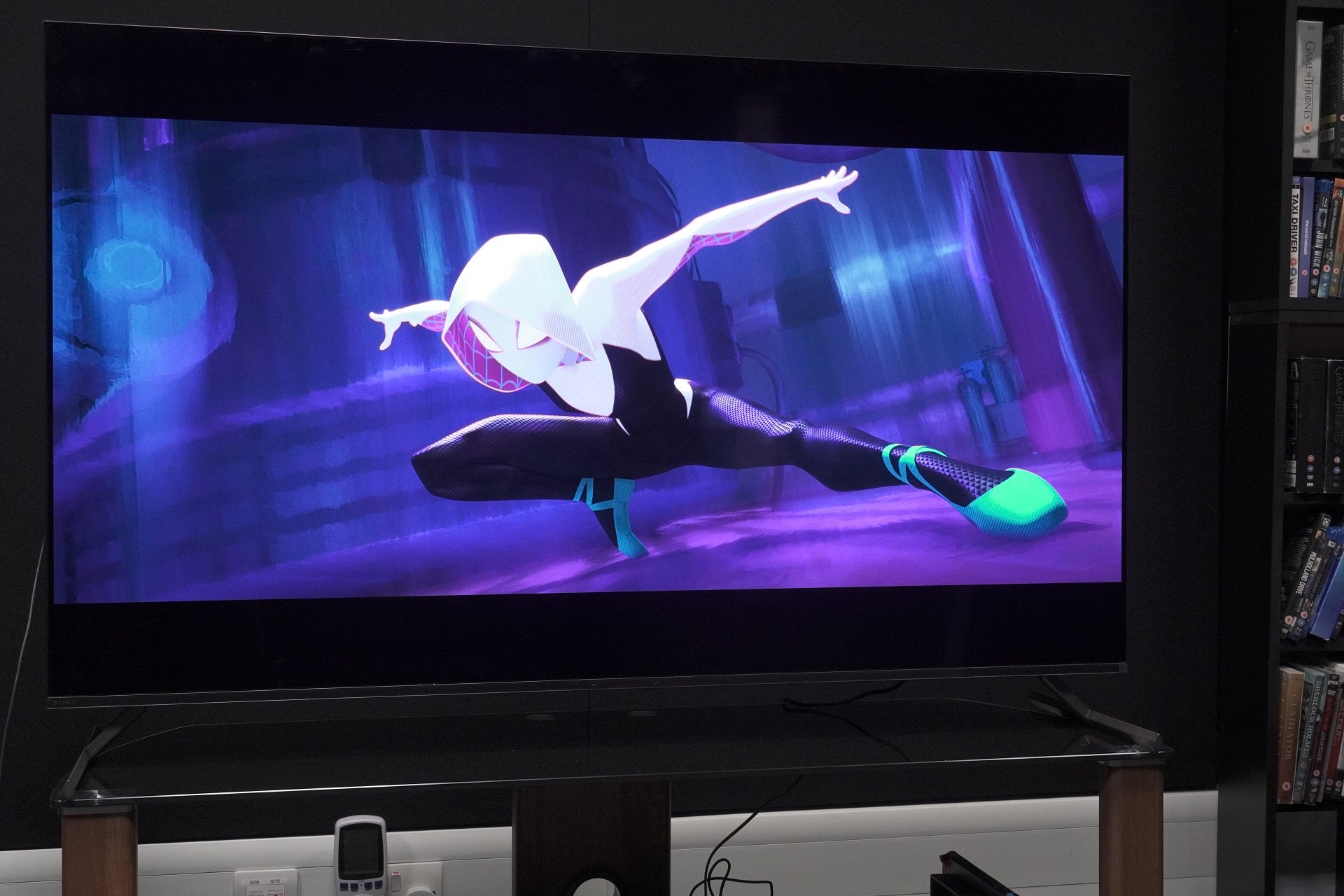Verdict
An excellent OLED for home cinema fans with its nuanced picture and sound quality that’s a step up over its rivals. It’s arguably more of what’s come before but it’s hard to critique the Sony A80L when the performance is this accomplished.
Pros
- Nuanced, natural picture performance
- Slick Google TV user experience
- Accommodating design
- Good sound for a TV
- Competitively priced
Cons
- Gaming best suited to PS5 owners
- Not as bright as rivals with HDR
-
Picture modesSupports Dolby Vision, BRAVIA Core, IMAX Enhanced and Netflix Adaptive Calibrated Mode -
SoundAcoustic Surface Audio+ system that vibrates screen to produce sound -
Perfect for PS5Supports VRR, ALLM and Auto HDR Tone Mapping for optimal performance with PS5 console -
Energy DashboardEco settings to manage energy usage
Introduction
The Sony XR-55A80L sits below the forthcoming A95L QD OLED and follows in the wake of mid-range OLEDs such as the A80J and A80K, the former being a TV this site liked a lot when reviewed in 2022.
Competition is formidable with the likes of the LG C3, Philips OLED808, and Samsung S90C but with the A80J’s performance still residing in our memory banks, it’s with hope the Sony A80L can perform just as well if not better.
Design
- Customisable stand
- Strong viewing angles
- Minimalist stylings
The design of Sony’s mid-range OLED has been consistent these last few years with its ‘One Slate’ design. The bezel is super-thin to the point where you’d need to squint to see it, which helps the screen take as much space as possible without a chunky bezel infiltrating the viewing experience.
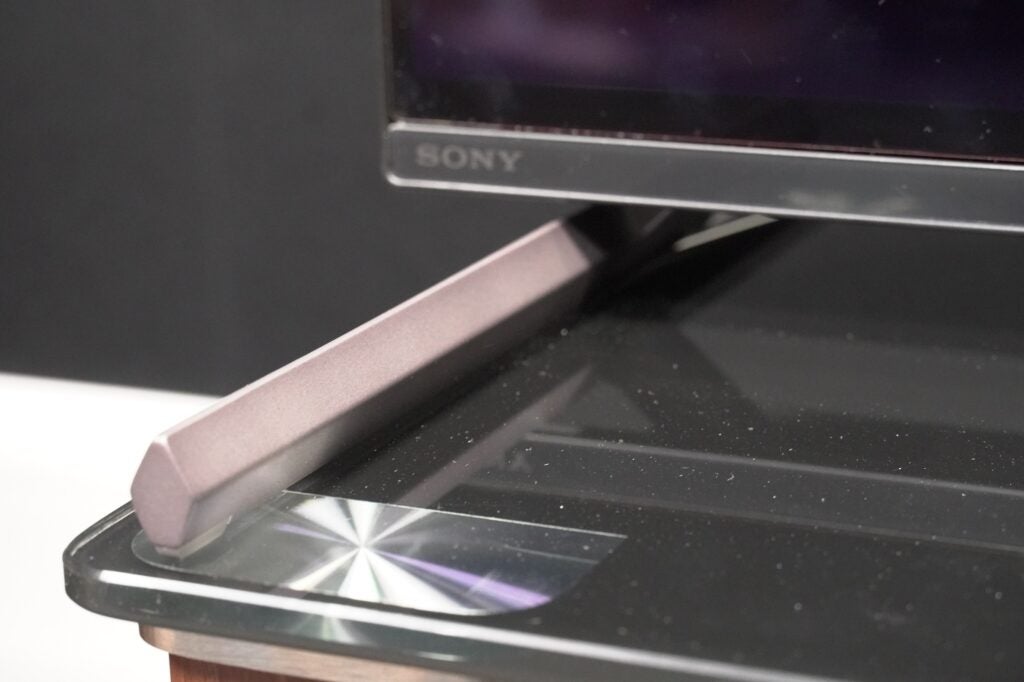
The feet (or wedges) can be arranged in one of three ways: out towards sides, in the centre or raised up to accommodate a soundbar. It’s fantastically versatile in terms of matching a space, though in its soundbar position it can only accommodate bars of a certain size. I tried to add Sony’s own HT-A5000, and it didn’t fit. Bigger bars will require more space in front of the TV to sit in.
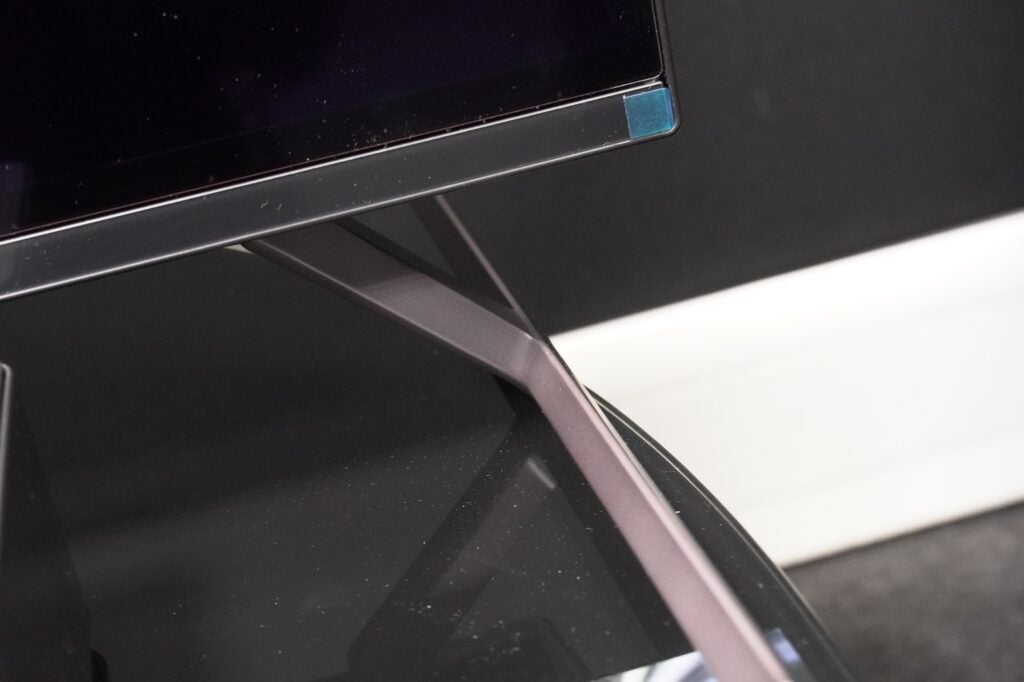
The rear bodywork gives it a bit of girth, stretching the depth out to 53mm. That’s not much but if you’re wall mounting the Sony XR-55A80L it won’t sit flush against a wall.
Viewing angles are strong – this is an OLED after all – but the A80L isn’t the brightest screen and will be best-served in dimmer, darker rooms.
Google TV interface
- Responsive interface
- Good remotes
- Lots of content recommendations
The UI is separated into several tabs: For You, Movies, TV, Apps, Library and Sony. For You is the general home screen with recommendations for stuff to watch, aided by ratings from Rotten Tomatoes that might convince you to click on a title.
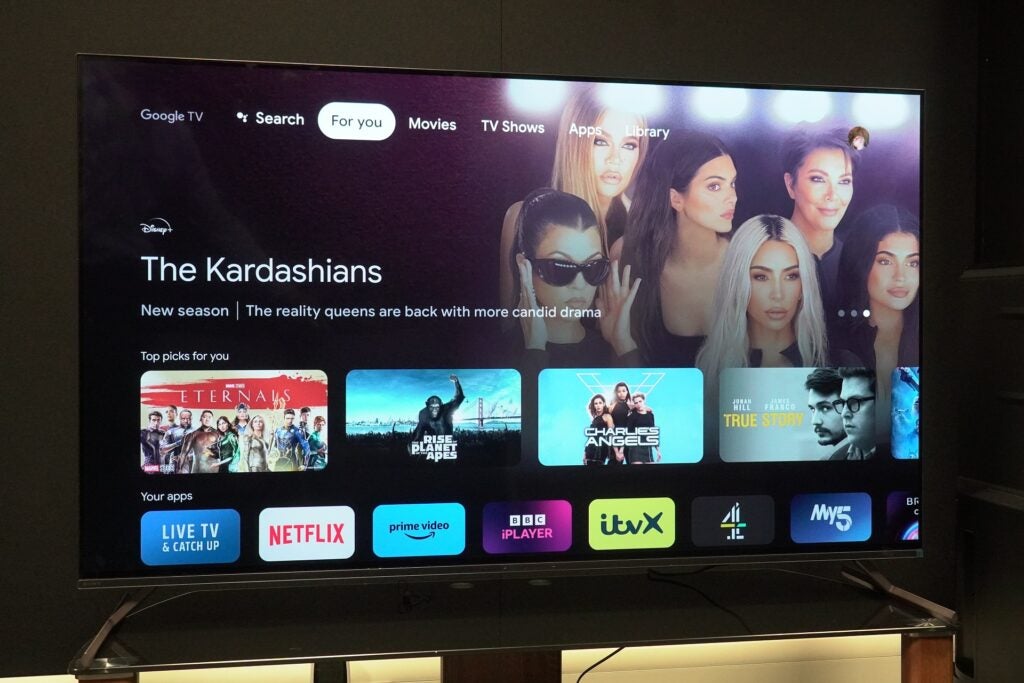
The ‘Continue Watching’ row makes it easier to dive back into a film or programme. It only works across certain apps such as Apple TV+, Disney+, Prime Video, and Netflix – content from UK catch-up and on-demand apps doesn’t show up here, which is a shame.
A couple of aspects I’m not fond of is the degree of scrolling to get to the bottom of the main screen. It gives me vibes of the endless Fire TV interface when it’d be better served by being condensed. Once at the bottom, you’ll (inexplicably) find the ‘Watchlist’ that gathers titles you’ve saved to watch later. While it can be accessed in the ‘Library’ tab, it ought to be much higher otherwise who would know it’s even there?
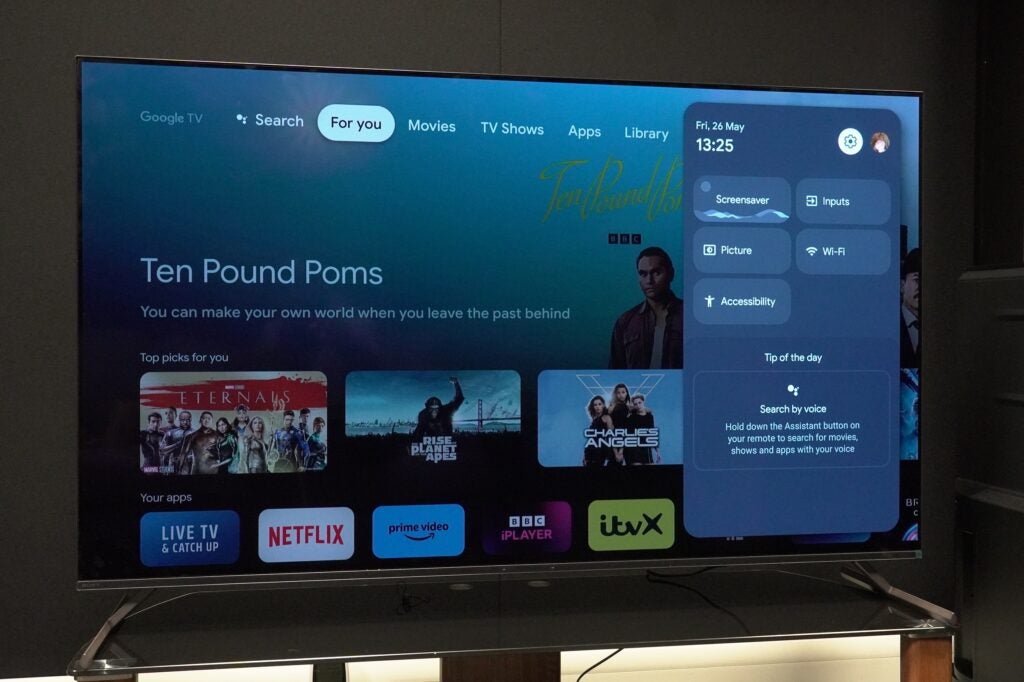
Quick settings can be accessed to the right (inputs, picture settings, notifications), or by pressing the settings button on the remote for just picture and sound settings.
Within the interface is Sony’s Eco settings, collating all the A80L’s power-saving features in one place. Technically there’s nothing here that’s new, but it’s presented differently with an image of a tree that grows branches and leaves to show the amount of energy being saved. Will it catch on? Perhaps, but energy saving results in a dimmer, less attractive image despite the energy saving promises.
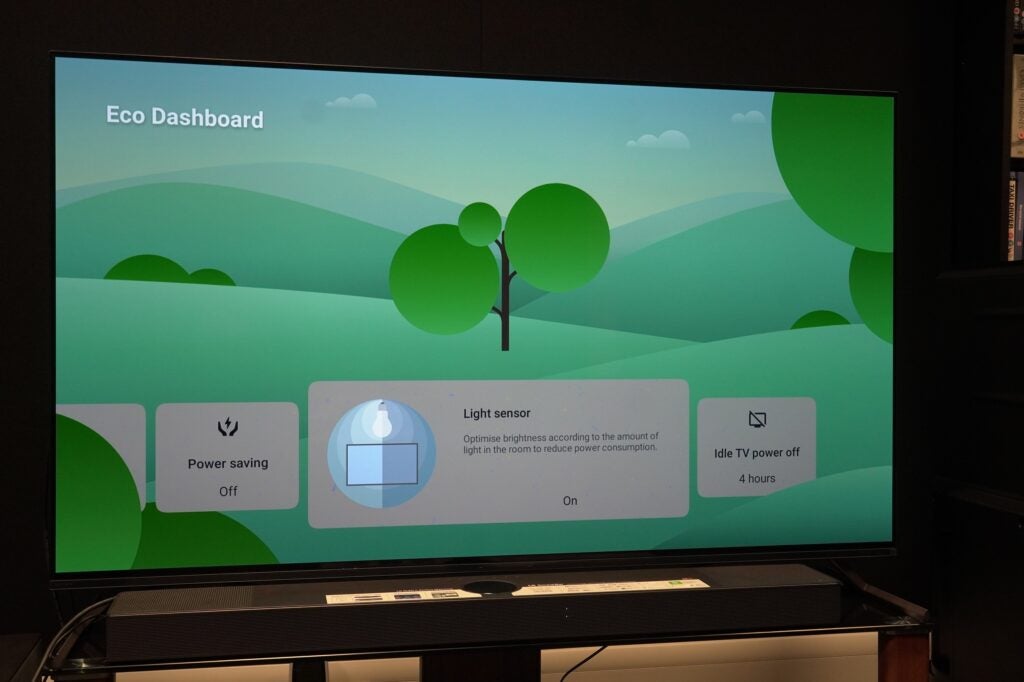
The remotes that ship with the Sony XR-55A80L are both of good quality. There’s one with an aluminium sheen that carries fewer buttons and feels nicely weighted with quick access buttons to the likes of Netflix, Prime Video, YouTube, and Disney+; as well as Sony’s own services in BRAVIA Core and Crunchyroll.
The other remote is packed with buttons, yet feels as nice to use with its soft, cushy button response. The lack of quick access buttons is the one aspect I miss not having on this remote.
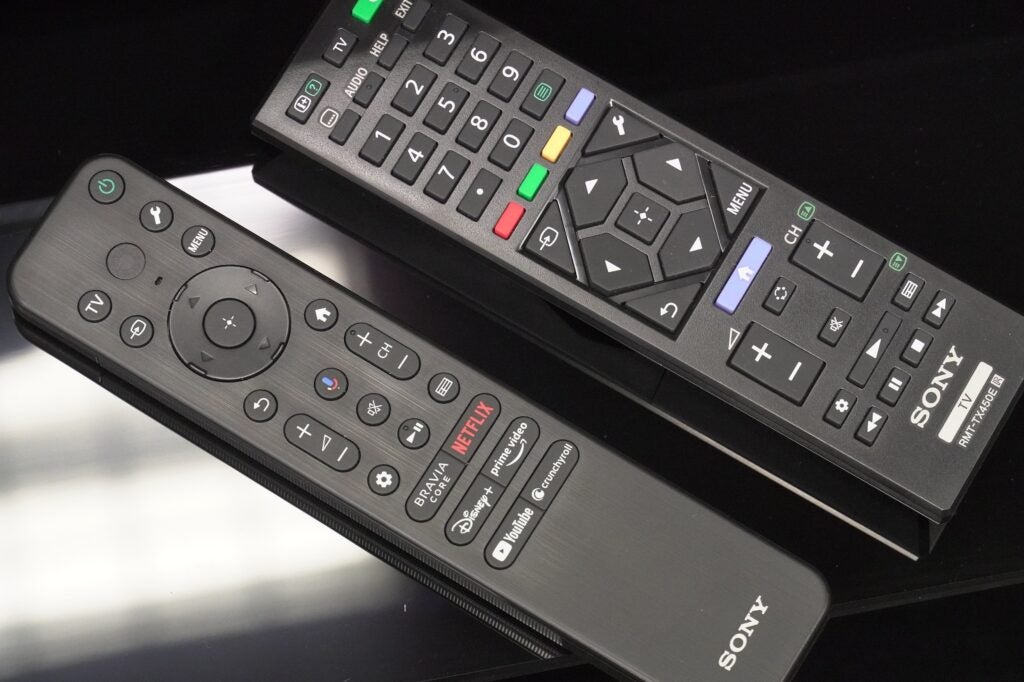
Features
- Two HDMI 2.1 inputs
- Solid input lag for gaming
- 4K/120Hz and VRR support
There are four HDMI inputs but only two are specified as HDMI 2.1 compatible (HDMI 3 and 4). Across those two inputs is support for eARC (for passthrough of lossless audio such as Dolby Atmos to a compatible soundbar), auto low latency mode and variable refresh rates.
If you have a soundbar connected to the eARC port, that leaves one other for another HDMI 2.1 device. If you have a PS5, an Xbox Series console, or any another 2.1 compliant device, then you’ll have only one input to play with.
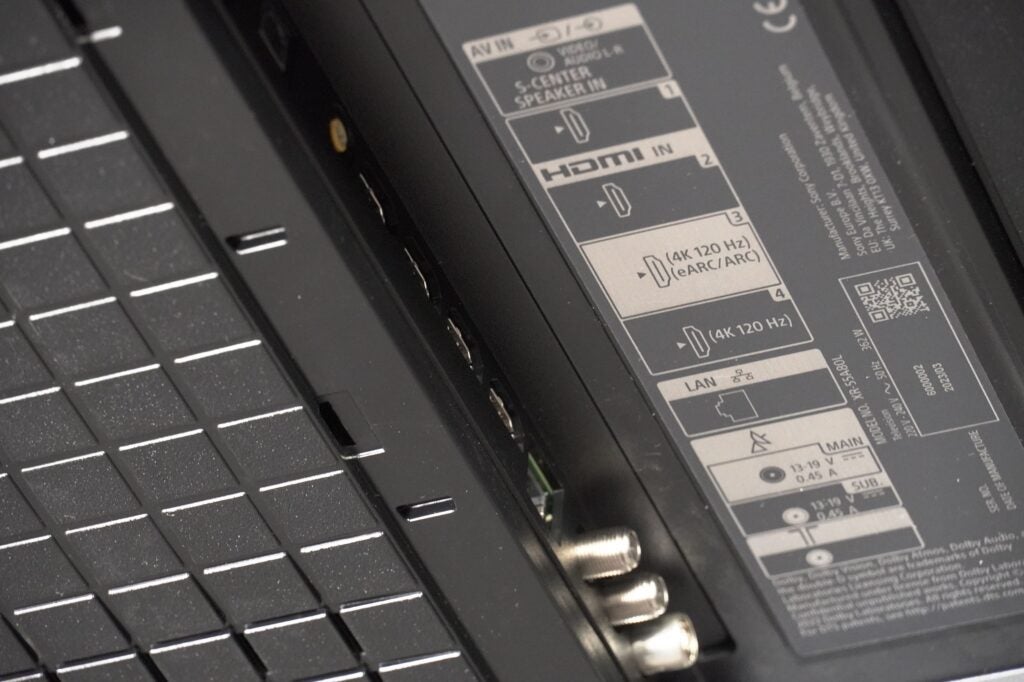
Other connections amount to a digital optical out, two USB ports, composite video input, Ethernet, two satellite connections and an input for terrestrial TV. Bluetooth 4.2 and Wi-Fi are wireless options, the latter adding Apple AirPlay 2 and Chromecast compatibility to stream from a device to the TV.
There are smarts but not as many found on an LG or Samsung with the A80L’s Google Assistant voice control and Apple HomeKit. Alexa control is possible through another connected device (say, an Echo speaker).
BRAVIA Core offers a range of Sony titles that can be streamed in 4K, and IMAX Enhanced. There’s also Netflix Adaptive Calibrated Mode that uses the TV’s light sensor to adjust contrast and brightness depending on the room’s lighting conditions.
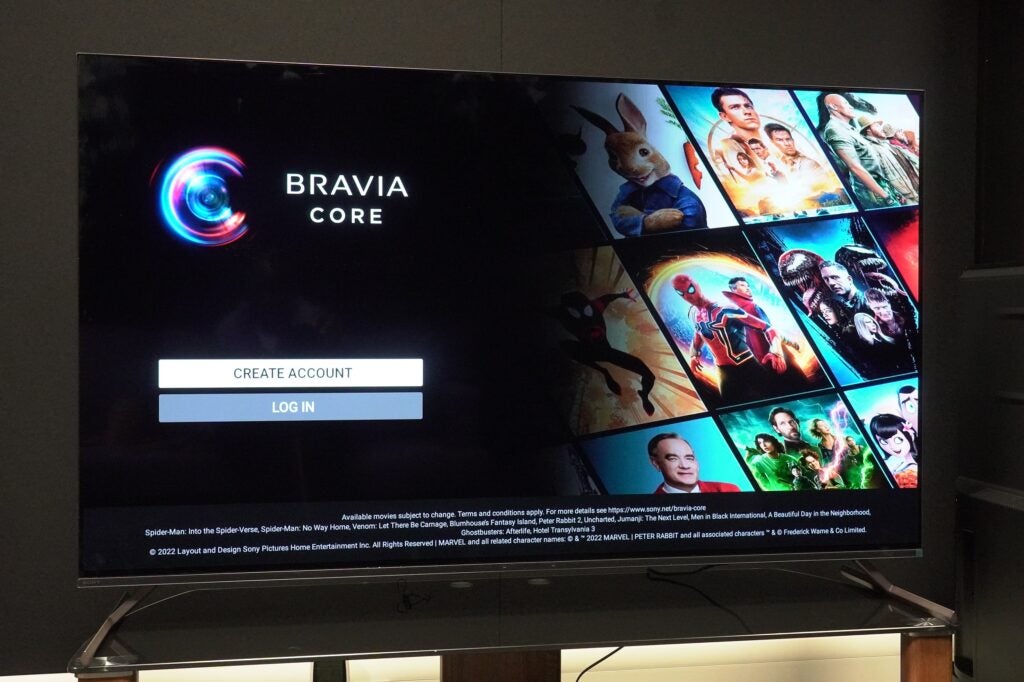
As the A80L and the PS5 are Sony devices there’s crossover with a few features. Auto Genre Picture mode (basically ALLM) automatically switches the TV in and out of its game ready state so the A80L isn’t stuck in game mode when you’re watching iPlayer, for example.
Auto HDR Tone Mapping enhances the HDR performance of the A80L’s screen for the best performance. Dolby Vision Gaming isn’t supported, but 4K/120Hz and variable refresh rates (VRR) are. I measured input lag at 16.4ms, which is not as fast as LG and Samsung OLEDs, but VRR can bring the level of latency down further.
Picture Quality
- Nuanced picture performance
- Excellent motion processing
- Rival OLEDs are brighter
Starting with the set’s upscaling and armed with a DVD of There Will Be Blood, the Sony XR-55A80L’s upscaling is not the sharpest but that seems deliberate to avoid producing an overly processed image.
There’s less noise and fuzziness than I expected for a DVD, the TV’s XR Clear Image tech identifies and defines characters’ faces, objects, and the landscape of the film’s opening (and wordless) sequence with decent definition.
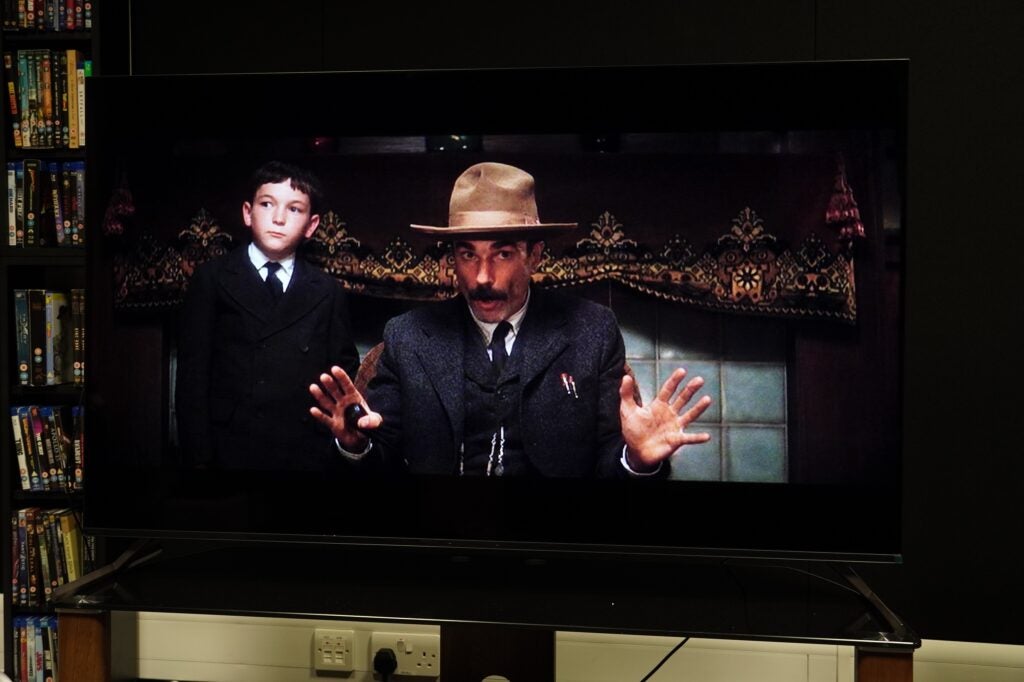
It drums up good levels of fine detail, whether it’s the clothes or grizzled, dirty faces and hands of Plainview and his prospectors. There’s a slight pixelated appearance to objects in the background of shots, but colours look natural, as do complexions. It’s a similar level of performance with a DVD of the Tree of Life, and though edges are soft, the film holds up decently on a 55-inch screen. Upscaling of 480p content is handled better than expected.
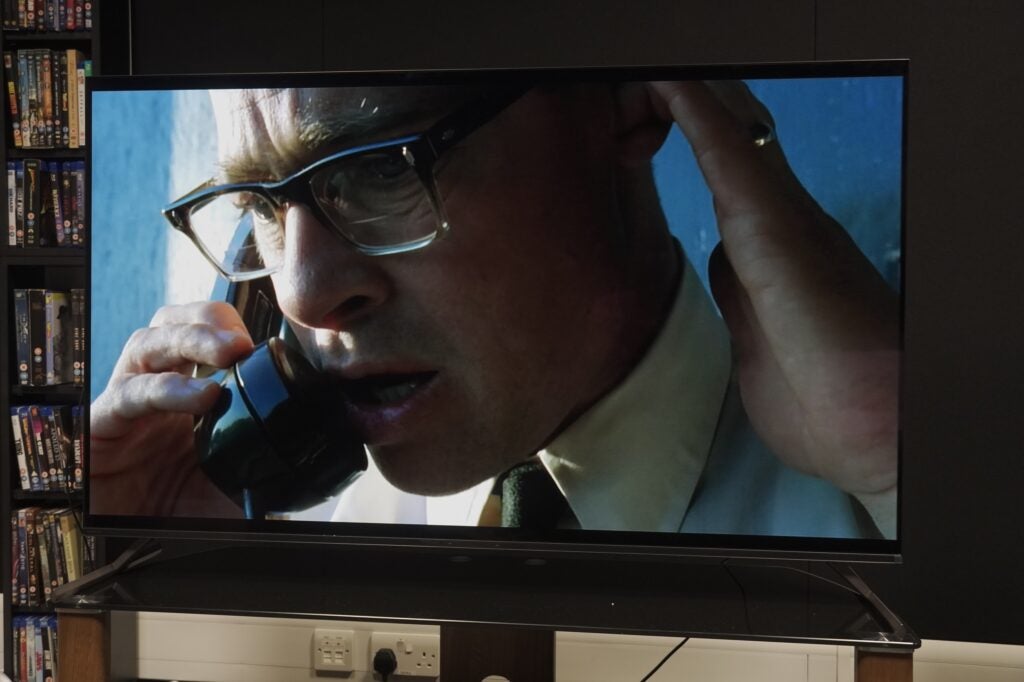
Moving to a Blu-ray of Taxi Driver, and the A80L’s upscaling doesn’t add nor detract from what’s already there, maintaining the film’s rich, filmic look. Colours are firm, natural, and wide ranging. It’s a great-looking presentation.
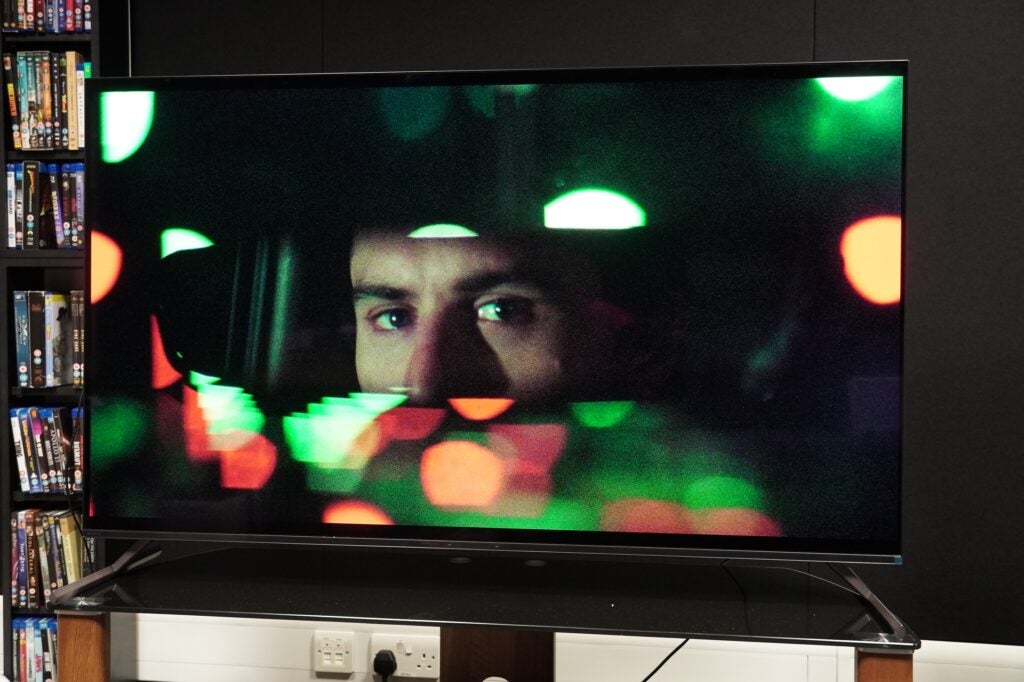
A Blu-ray of Thor: The Dark World shows the A80L isn’t interested in a razor-sharp presentation – the LG C3 has the edge in that context – but the Sony offers high levels of detail and clarity. Colours are rich, especially in the scenes set on Asgard with lovely golds and reds, and the A80L conveys an excellent sense of contrast in the film’s darker scenes. It’s a consistently handsome image.
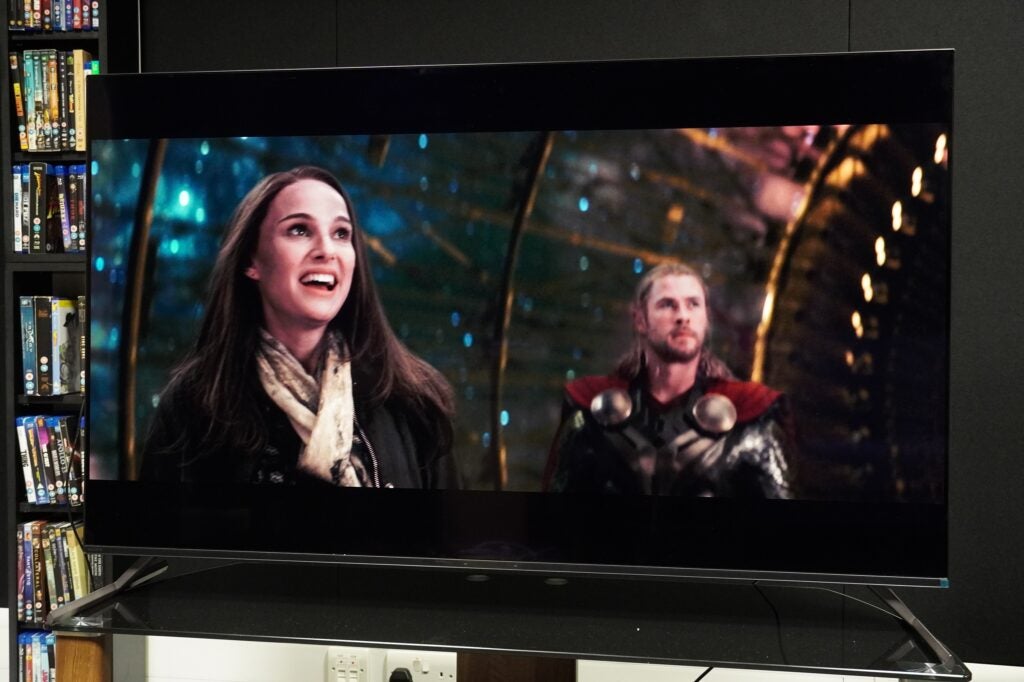
With HDR the Sony A80L isn’t as bright as the LG C3 or Samsung S90C. Measured on a 10% HDR window, it tops out at 724 nits in Standard mode and 699 nits in Custom. It doles out a little more brightness with smaller highlights than larger objects but the C3 hits greater peaks than the Sony A80L can muster.
That results in scenes that don’t have as much punch or vibrancy and comparing the A80L to a (65-inch) Samsung S90C demonstrates that some daytime scenes have a grey British ‘overcast’ morning on the A80L. But what the Sony lacks in outright brightness, it makes up for in terms of finesse, nuance, and subtlety, crafting images that feel more authentically filmic than they do on the Samsung, especially in HDR.
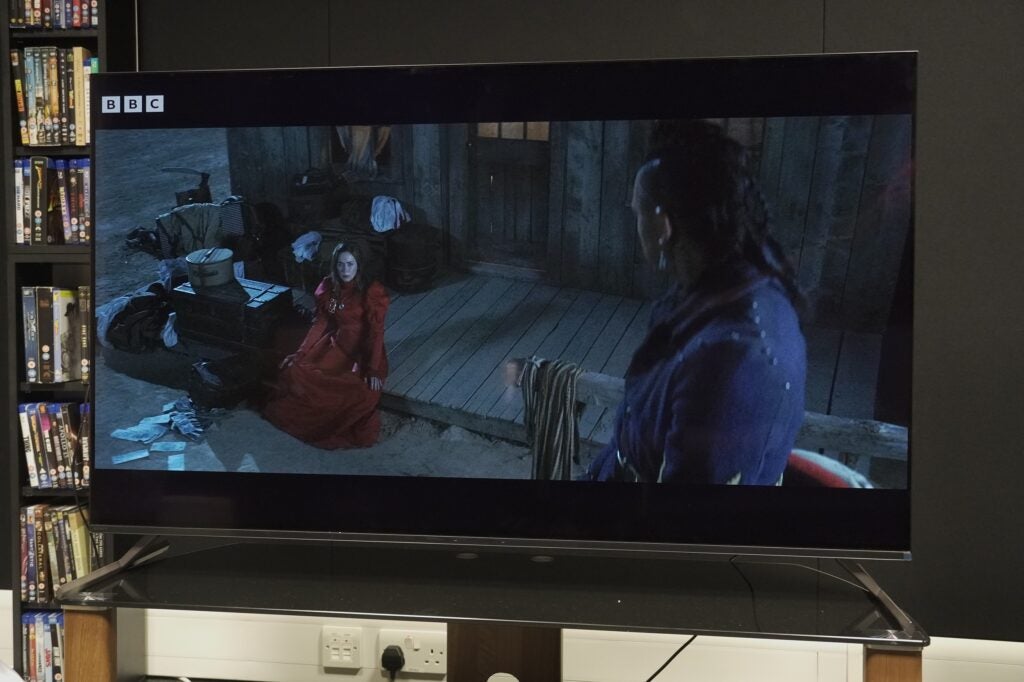
Watching The English in HLG HDR on iPlayer (in Standard mode), the A80L brings out the TV’s gorgeously rich colour palette with its lush, rich, and verdant greens, deep blues, and high contrast cinematography. The A80L ekes out good brightness with highlights (a scene with candlelights looks fabulous) and combined with OLED’s excellent black levels and contrast, night-time scenes look sumptuous.
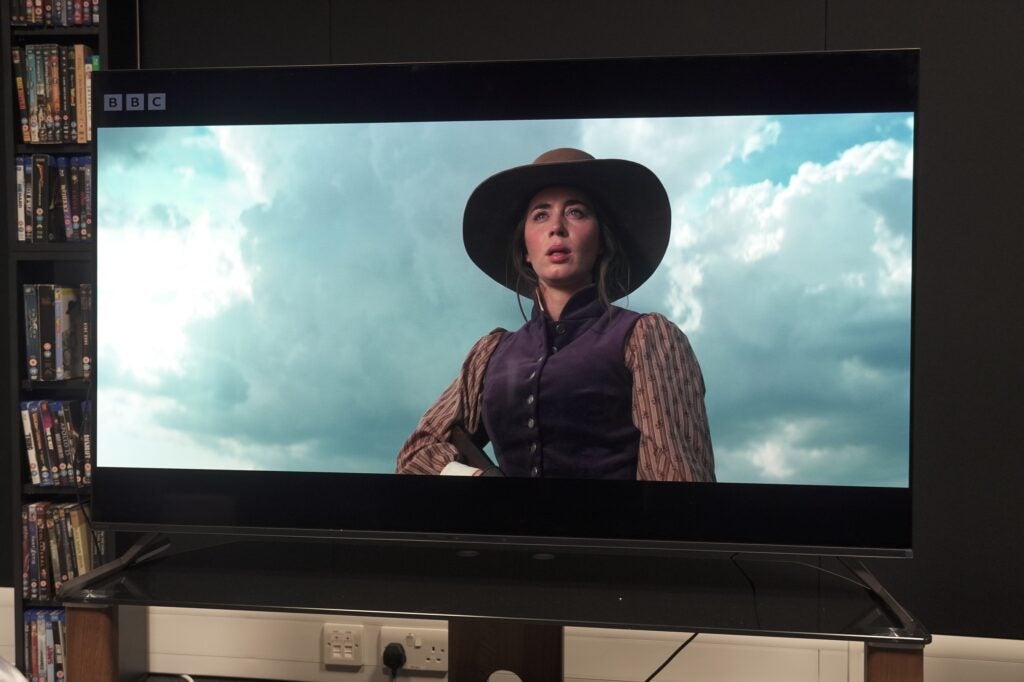
Complexions are drawn in a convincingly natural manner; the A80L reveals the shades and tones of actors’ faces with more nuance than the Samsung S90C manages. Its sense of detail in an image’s darkest parts is more robust and revealing, and add to that its stronger, richer black levels, better sense of depth to the image and definition to edges – and the Sony frequently wows.
With Extraction II on Netflix, it’s lift-off in terms of clarity, sharpness, and definition with this Dolby Vision-graded film. The Sony is at its best with 4K HDR content, so while the crisp, muted colours of the Extraction sequel don’t leap off the screen, the biggest compliment I can pay is that the A80L renders it all in a convincingly natural way.
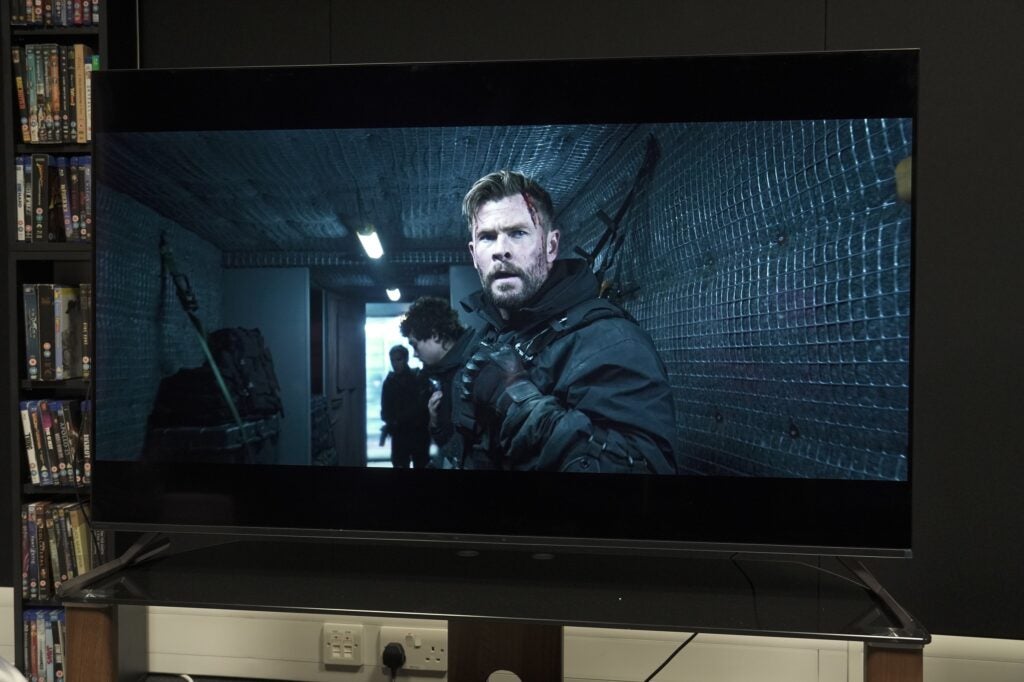
And to further extol the A80L’s picture qualities, Sony’s motion processing is class-leading. Blurriness and noise with movement is virtually erased, judder is managed to a minimum and rarely an issue in the fast and flowing one-shot scenes of Extraction II. It can look a little weird on some o, the Soap Opera Effect (SOE) is a touch more noticeable when watching DVDs, but more often than not the Sony A80L is consistently smooth, natural, and clear with its motion processing.
Sound Quality
- Clear, detailed sound
- DTS support
Packing Sony’s Acoustic Surface Audio+ set-up, the A80L’s audio performance is much better than the competition it’s up against. It captures Johnny Greenwood’s expansive, dynamic score in There Will Be Blood well, delivering a big spacious soundstage with crisp, clear vocal clarity.
With The English the Sony conveys more intensity and volume than the Samsung S90C: gunshots, dialogue and music all carry more impact on the A80L. It’s sharper, better in terms of detail and definition, and conveys the ambient sounds in scenes with more clarity. Scenes feel much more vividly realised than they do on the Samsung rival.
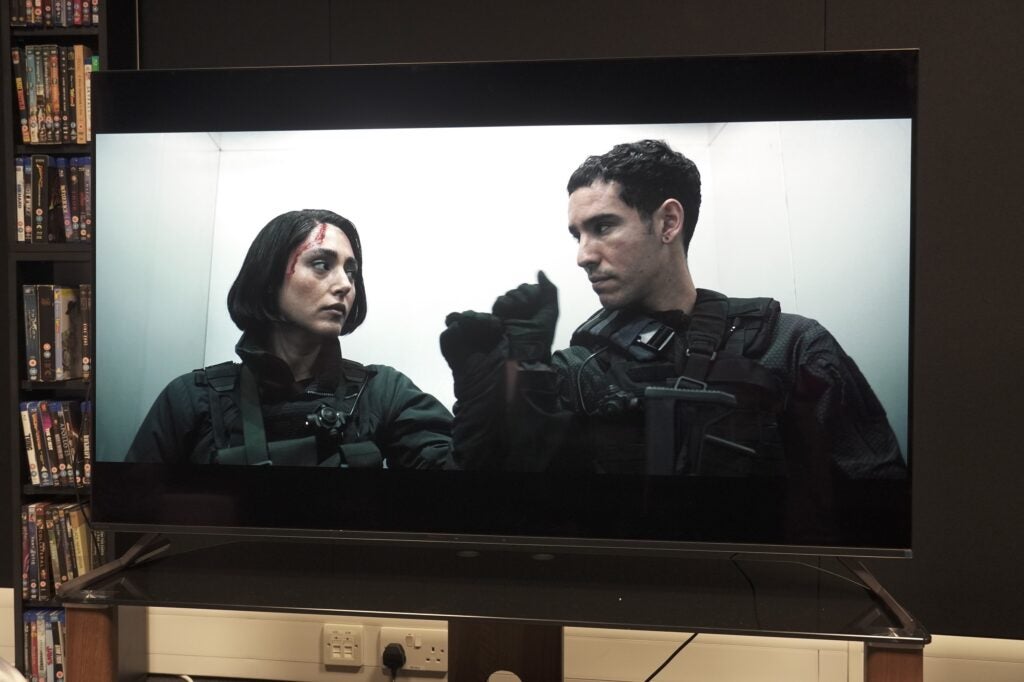
Bass is decent and avoids distortion when the volume is pushed up but there is a limit to how deep it can go. Sounds are mapped to their position on screen well and steered across the screen effectively, adding to the A80L’s sense of precision.
It’s worth noting the Sony can pass-through DTS audio, which is great for home cinema fans who have a sound system compatible with DTS tracks.
Latest deals
Should you buy it?
For a more nuanced and defined 4K picture than its rivals: Like it was with the A80J, the A80L proves itself to be a very revealing performer with 4K HDR content.
If you believe brighter is better: The A80L gives up some HDR brightness to the LG C3 and Samsung S90C, lacking some vibrancy and punch with some HDR content.
Final Thoughts
Like the A80J, the Sony XR-55A80L is very clearly a TV with designs on the home cinema market. It’s not as wide-ranging in its talents as either the LG C3 or Samsung S90C when it comes to smarts and (general) gaming, nor is it as bright as those TVs with HDR content, giving up a degree of punch and vibrancy to those screens.
But it’s capable of greater nuance and subtlety with its picture, its motion skills are class-leading, and it sounds better than either rival. A design that accommodates different placements, and a slick user interface are ticks in the positive column. It’s competitively priced too, making the Sony XR-55A80L an excellent option for home cinema fans.
How we test
We test every television we review thoroughly over an extended period of time. We use industry standard tests to compare features properly. We’ll always tell you what we find. We never, ever, accept money to review a product.
Find out more about how we test in our ethics policy.
Tested with real world use
FAQs
At the time of review (July 2023), the Sony A80L does not support gaming in Dolby Vision HDR.
Verdict
An excellent OLED for home cinema fans with its nuanced picture and sound quality that’s a step up over its rivals. It’s arguably more of what’s come before but it’s hard to critique the Sony A80L when the performance is this accomplished.
Pros
- Nuanced, natural picture performance
- Slick Google TV user experience
- Accommodating design
- Good sound for a TV
- Competitively priced
Cons
- Gaming best suited to PS5 owners
- Not as bright as rivals with HDR
-
Picture modesSupports Dolby Vision, BRAVIA Core, IMAX Enhanced and Netflix Adaptive Calibrated Mode -
SoundAcoustic Surface Audio+ system that vibrates screen to produce sound -
Perfect for PS5Supports VRR, ALLM and Auto HDR Tone Mapping for optimal performance with PS5 console -
Energy DashboardEco settings to manage energy usage
Introduction
The Sony XR-55A80L sits below the forthcoming A95L QD OLED and follows in the wake of mid-range OLEDs such as the A80J and A80K, the former being a TV this site liked a lot when reviewed in 2022.
Competition is formidable with the likes of the LG C3, Philips OLED808, and Samsung S90C but with the A80J’s performance still residing in our memory banks, it’s with hope the Sony A80L can perform just as well if not better.
Design
- Customisable stand
- Strong viewing angles
- Minimalist stylings
The design of Sony’s mid-range OLED has been consistent these last few years with its ‘One Slate’ design. The bezel is super-thin to the point where you’d need to squint to see it, which helps the screen take as much space as possible without a chunky bezel infiltrating the viewing experience.

The feet (or wedges) can be arranged in one of three ways: out towards sides, in the centre or raised up to accommodate a soundbar. It’s fantastically versatile in terms of matching a space, though in its soundbar position it can only accommodate bars of a certain size. I tried to add Sony’s own HT-A5000, and it didn’t fit. Bigger bars will require more space in front of the TV to sit in.

The rear bodywork gives it a bit of girth, stretching the depth out to 53mm. That’s not much but if you’re wall mounting the Sony XR-55A80L it won’t sit flush against a wall.
Viewing angles are strong – this is an OLED after all – but the A80L isn’t the brightest screen and will be best-served in dimmer, darker rooms.
Google TV interface
- Responsive interface
- Good remotes
- Lots of content recommendations
The UI is separated into several tabs: For You, Movies, TV, Apps, Library and Sony. For You is the general home screen with recommendations for stuff to watch, aided by ratings from Rotten Tomatoes that might convince you to click on a title.

The ‘Continue Watching’ row makes it easier to dive back into a film or programme. It only works across certain apps such as Apple TV+, Disney+, Prime Video, and Netflix – content from UK catch-up and on-demand apps doesn’t show up here, which is a shame.
A couple of aspects I’m not fond of is the degree of scrolling to get to the bottom of the main screen. It gives me vibes of the endless Fire TV interface when it’d be better served by being condensed. Once at the bottom, you’ll (inexplicably) find the ‘Watchlist’ that gathers titles you’ve saved to watch later. While it can be accessed in the ‘Library’ tab, it ought to be much higher otherwise who would know it’s even there?

Quick settings can be accessed to the right (inputs, picture settings, notifications), or by pressing the settings button on the remote for just picture and sound settings.
Within the interface is Sony’s Eco settings, collating all the A80L’s power-saving features in one place. Technically there’s nothing here that’s new, but it’s presented differently with an image of a tree that grows branches and leaves to show the amount of energy being saved. Will it catch on? Perhaps, but energy saving results in a dimmer, less attractive image despite the energy saving promises.

The remotes that ship with the Sony XR-55A80L are both of good quality. There’s one with an aluminium sheen that carries fewer buttons and feels nicely weighted with quick access buttons to the likes of Netflix, Prime Video, YouTube, and Disney+; as well as Sony’s own services in BRAVIA Core and Crunchyroll.
The other remote is packed with buttons, yet feels as nice to use with its soft, cushy button response. The lack of quick access buttons is the one aspect I miss not having on this remote.

Features
- Two HDMI 2.1 inputs
- Solid input lag for gaming
- 4K/120Hz and VRR support
There are four HDMI inputs but only two are specified as HDMI 2.1 compatible (HDMI 3 and 4). Across those two inputs is support for eARC (for passthrough of lossless audio such as Dolby Atmos to a compatible soundbar), auto low latency mode and variable refresh rates.
If you have a soundbar connected to the eARC port, that leaves one other for another HDMI 2.1 device. If you have a PS5, an Xbox Series console, or any another 2.1 compliant device, then you’ll have only one input to play with.

Other connections amount to a digital optical out, two USB ports, composite video input, Ethernet, two satellite connections and an input for terrestrial TV. Bluetooth 4.2 and Wi-Fi are wireless options, the latter adding Apple AirPlay 2 and Chromecast compatibility to stream from a device to the TV.
There are smarts but not as many found on an LG or Samsung with the A80L’s Google Assistant voice control and Apple HomeKit. Alexa control is possible through another connected device (say, an Echo speaker).
BRAVIA Core offers a range of Sony titles that can be streamed in 4K, and IMAX Enhanced. There’s also Netflix Adaptive Calibrated Mode that uses the TV’s light sensor to adjust contrast and brightness depending on the room’s lighting conditions.

As the A80L and the PS5 are Sony devices there’s crossover with a few features. Auto Genre Picture mode (basically ALLM) automatically switches the TV in and out of its game ready state so the A80L isn’t stuck in game mode when you’re watching iPlayer, for example.
Auto HDR Tone Mapping enhances the HDR performance of the A80L’s screen for the best performance. Dolby Vision Gaming isn’t supported, but 4K/120Hz and variable refresh rates (VRR) are. I measured input lag at 16.4ms, which is not as fast as LG and Samsung OLEDs, but VRR can bring the level of latency down further.
Picture Quality
- Nuanced picture performance
- Excellent motion processing
- Rival OLEDs are brighter
Starting with the set’s upscaling and armed with a DVD of There Will Be Blood, the Sony XR-55A80L’s upscaling is not the sharpest but that seems deliberate to avoid producing an overly processed image.
There’s less noise and fuzziness than I expected for a DVD, the TV’s XR Clear Image tech identifies and defines characters’ faces, objects, and the landscape of the film’s opening (and wordless) sequence with decent definition.

It drums up good levels of fine detail, whether it’s the clothes or grizzled, dirty faces and hands of Plainview and his prospectors. There’s a slight pixelated appearance to objects in the background of shots, but colours look natural, as do complexions. It’s a similar level of performance with a DVD of the Tree of Life, and though edges are soft, the film holds up decently on a 55-inch screen. Upscaling of 480p content is handled better than expected.

Moving to a Blu-ray of Taxi Driver, and the A80L’s upscaling doesn’t add nor detract from what’s already there, maintaining the film’s rich, filmic look. Colours are firm, natural, and wide ranging. It’s a great-looking presentation.

A Blu-ray of Thor: The Dark World shows the A80L isn’t interested in a razor-sharp presentation – the LG C3 has the edge in that context – but the Sony offers high levels of detail and clarity. Colours are rich, especially in the scenes set on Asgard with lovely golds and reds, and the A80L conveys an excellent sense of contrast in the film’s darker scenes. It’s a consistently handsome image.

With HDR the Sony A80L isn’t as bright as the LG C3 or Samsung S90C. Measured on a 10% HDR window, it tops out at 724 nits in Standard mode and 699 nits in Custom. It doles out a little more brightness with smaller highlights than larger objects but the C3 hits greater peaks than the Sony A80L can muster.
That results in scenes that don’t have as much punch or vibrancy and comparing the A80L to a (65-inch) Samsung S90C demonstrates that some daytime scenes have a grey British ‘overcast’ morning on the A80L. But what the Sony lacks in outright brightness, it makes up for in terms of finesse, nuance, and subtlety, crafting images that feel more authentically filmic than they do on the Samsung, especially in HDR.

Watching The English in HLG HDR on iPlayer (in Standard mode), the A80L brings out the TV’s gorgeously rich colour palette with its lush, rich, and verdant greens, deep blues, and high contrast cinematography. The A80L ekes out good brightness with highlights (a scene with candlelights looks fabulous) and combined with OLED’s excellent black levels and contrast, night-time scenes look sumptuous.

Complexions are drawn in a convincingly natural manner; the A80L reveals the shades and tones of actors’ faces with more nuance than the Samsung S90C manages. Its sense of detail in an image’s darkest parts is more robust and revealing, and add to that its stronger, richer black levels, better sense of depth to the image and definition to edges – and the Sony frequently wows.
With Extraction II on Netflix, it’s lift-off in terms of clarity, sharpness, and definition with this Dolby Vision-graded film. The Sony is at its best with 4K HDR content, so while the crisp, muted colours of the Extraction sequel don’t leap off the screen, the biggest compliment I can pay is that the A80L renders it all in a convincingly natural way.

And to further extol the A80L’s picture qualities, Sony’s motion processing is class-leading. Blurriness and noise with movement is virtually erased, judder is managed to a minimum and rarely an issue in the fast and flowing one-shot scenes of Extraction II. It can look a little weird on some o, the Soap Opera Effect (SOE) is a touch more noticeable when watching DVDs, but more often than not the Sony A80L is consistently smooth, natural, and clear with its motion processing.
Sound Quality
- Clear, detailed sound
- DTS support
Packing Sony’s Acoustic Surface Audio+ set-up, the A80L’s audio performance is much better than the competition it’s up against. It captures Johnny Greenwood’s expansive, dynamic score in There Will Be Blood well, delivering a big spacious soundstage with crisp, clear vocal clarity.
With The English the Sony conveys more intensity and volume than the Samsung S90C: gunshots, dialogue and music all carry more impact on the A80L. It’s sharper, better in terms of detail and definition, and conveys the ambient sounds in scenes with more clarity. Scenes feel much more vividly realised than they do on the Samsung rival.

Bass is decent and avoids distortion when the volume is pushed up but there is a limit to how deep it can go. Sounds are mapped to their position on screen well and steered across the screen effectively, adding to the A80L’s sense of precision.
It’s worth noting the Sony can pass-through DTS audio, which is great for home cinema fans who have a sound system compatible with DTS tracks.
Latest deals
Should you buy it?
For a more nuanced and defined 4K picture than its rivals: Like it was with the A80J, the A80L proves itself to be a very revealing performer with 4K HDR content.
If you believe brighter is better: The A80L gives up some HDR brightness to the LG C3 and Samsung S90C, lacking some vibrancy and punch with some HDR content.
Final Thoughts
Like the A80J, the Sony XR-55A80L is very clearly a TV with designs on the home cinema market. It’s not as wide-ranging in its talents as either the LG C3 or Samsung S90C when it comes to smarts and (general) gaming, nor is it as bright as those TVs with HDR content, giving up a degree of punch and vibrancy to those screens.
But it’s capable of greater nuance and subtlety with its picture, its motion skills are class-leading, and it sounds better than either rival. A design that accommodates different placements, and a slick user interface are ticks in the positive column. It’s competitively priced too, making the Sony XR-55A80L an excellent option for home cinema fans.
How we test
We test every television we review thoroughly over an extended period of time. We use industry standard tests to compare features properly. We’ll always tell you what we find. We never, ever, accept money to review a product.
Find out more about how we test in our ethics policy.
Tested with real world use
FAQs
At the time of review (July 2023), the Sony A80L does not support gaming in Dolby Vision HDR.


















